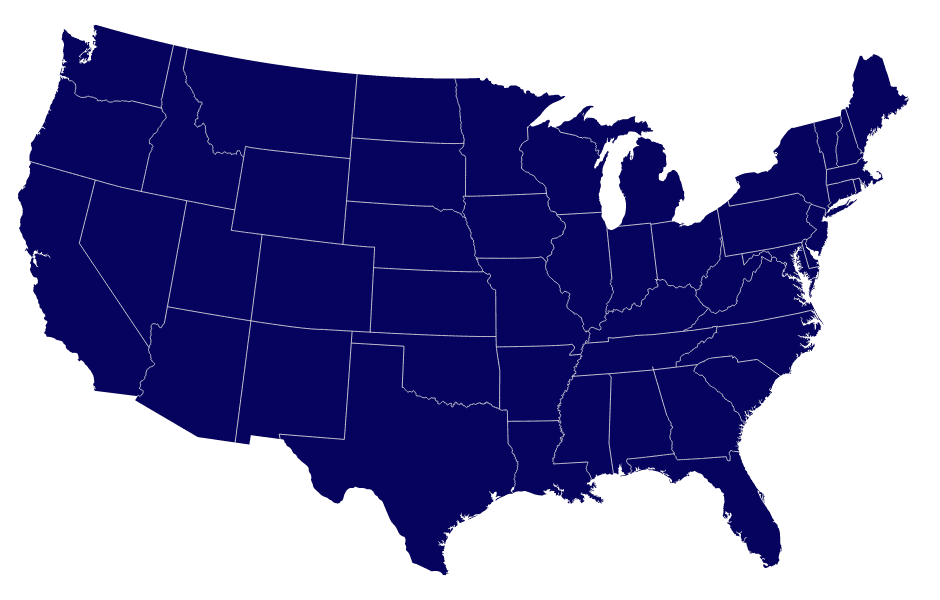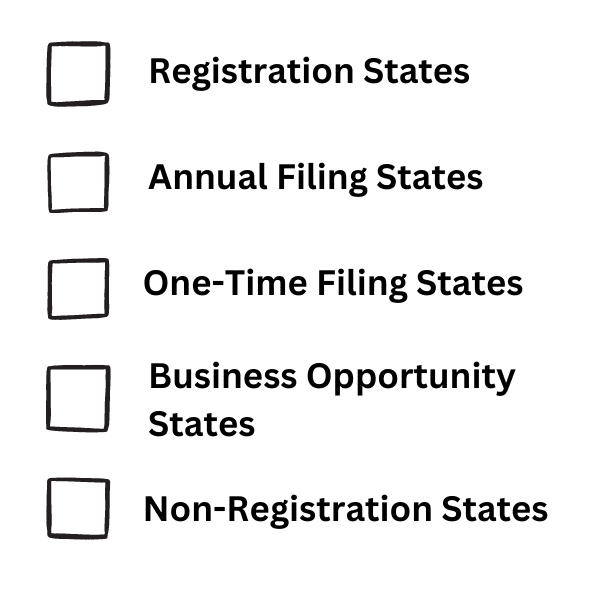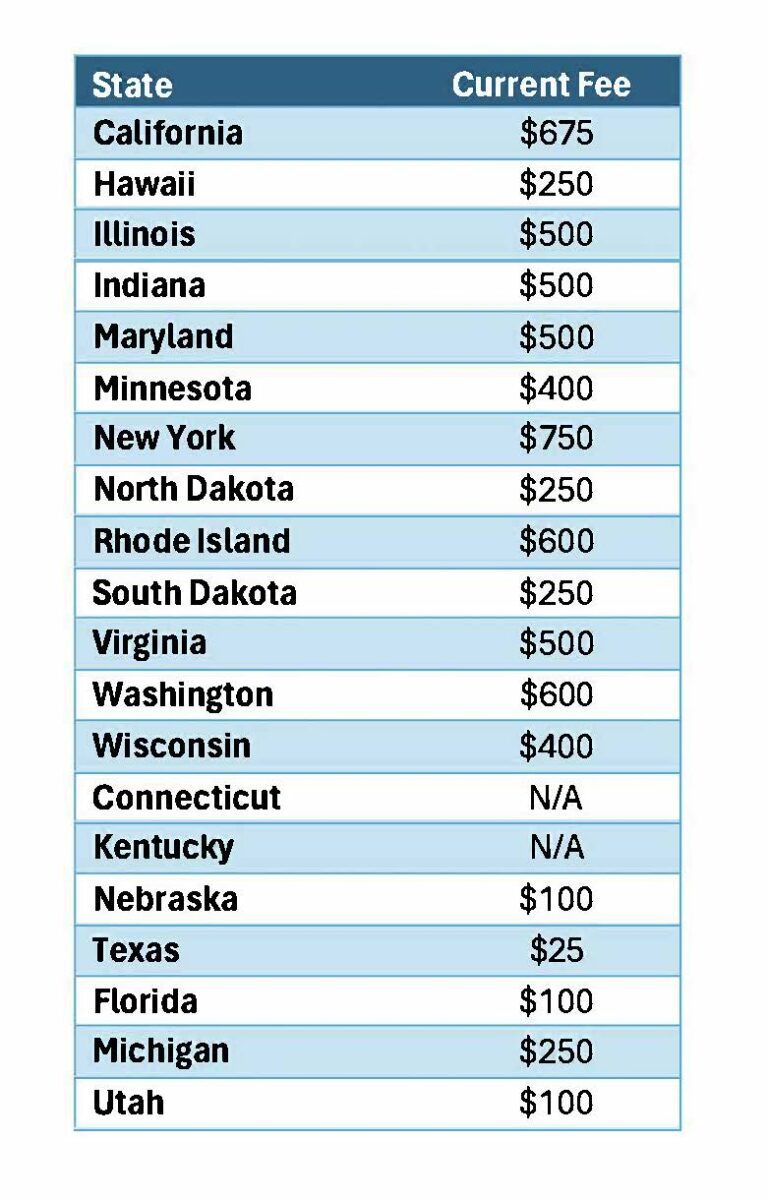Franchise Laws by State
The offer and sale of franchise opportunities in the United States are governed by federal and state laws, rules, and regulations. The the federal level, the Franchise Rule establishes the framework for offering and selling franchises by disclosure of a franchise disclosure document. However, there is no federal approval process for offering franchises. Instead, oversight is left to state regulators.
Certain states have enacted franchise specific laws and general business opportunity laws. These state laws supplement the federal Franchise Rule and impose various duties and obligations on franchisors to follow on a state-by-state basis. Its important to understand the variances in state franchise laws when offering franchise opportunities throughout the United States.

States Regulate the offer and sale of franchise opportunities
Federal law applies in all states; however, each state can supplement law through laws, rules, and regulations.
Understanding state franchise laws is essentially when planning to franchise, in terms of budgeting, operations, and compliance. Obtaining state approval is an indespensible part of franchising on a nationwide level.
There are 5 separate categories commonly used in franchising to describe the degree of regulation deployed by a particular state.
Franchise Registration States
In franchise registration states, a franchisor must generally submit application materials and obtain regulators approval before offering any franchise opportunities.
Annual Filing States
In annual filing states, a franchisor can offer and sale franchises in with a valid FDD if they file an annual notice.
One-time Filing States
In one-time filing states, a franchisor can offer and sale franchises in perpetuity (subject to changes in state law) with a valid FDD after they file a one-time notice.
Business Opportunity States
In business opportunity states, franchisors must register as a business opportunity unless they have a federally registered trademark or another exemption applies.
Non-registration States
In non-registration states, a franchisor can offer and sale franchises on a valid FDD without obtaining any state approval.

State By State Franchise Laws
What states do not require franchise registration?
The "non-registration states"
- Alabama
- Alaska
- Arizona
- Arkansas
- Colorado
- Delaware
- District of Columbia
- Idaho
- Iowa
- Kansas
- Massachusetts
- Mississippi
- Missouri
- Montana
- Nevada
- New Hampshire
- New Jersey
- New Mexico
- Ohio
- Oklahoma
- Oregon
- Pennsylvania
- Tennessee
- Vermont
- Virginia
- West Virginia
- Wyoming
What states have business opportunity laws?
The "business opportunity states"
- Connecticut*
- Georgia
- Louisiana
- Maine
- North Carolina
- South Carolina
What states have one-time filing requirements
The "one-time filing states"
- Connecticut*
- Kentucky
- Nebraska
- Texas
The Cost to Franchise In Registration States
Registration and Filing Fees
Registration and filing are calculated on a state-by-state basis in the states with franchise specific laws. The initial filing fees posted here are current as of July 1, 2024. These fees are paid directly to the state, the frequency of which depends on the degree of state registration required. Renewal fees are less than initial fees in many states.
System Fees
The most common way of filing in the digital age is through electronic filing. Many states use a centralized filing system known as FRED (short for NASAA’s Franchise Electronic Depository). There is a fee associated with each filing. Currently, new registrations have a system fee of $100 each and renewal filings have a fee of $50 each. Certain states operate their own database and they do not charge a fee for electronic filing. Regardless, filing electronically is much quicker and is well worth the filing fee.
Attorney Fees
Franchises typically engage law firms on a fixed cost subscription model. This is because franchisors typically need ongoing legal support to maintain compliance, disclose prospects, and execute new franchise agreements. The cost will depend on the law firm and size of the franchise system, but we have seen ongoing fees range from $1,200 to $3,500 per month for an emerging franchisor. The cost will increase as the system becomes more established or one-off expenses arise.
Auditor Fees
Franchisors are required to obtain an audit of their financial records each year. There is an exception at the federal level which permits a phase-in of the audit requirement, but the exception does not exist in franchise registration states. For most franchisors, this means an audit is required to launch and each year thereafter. The cost of audit will vary greatly based on the entity structure, size, and number of transactions. The audit report is a required portion of the FDD.

Partner with a franchise attorney
Navigating franchise laws and tracking the approval process can seem like a daunting task for any business executive. The key to managing the burdens of legal compliance is working with experienced franchise counsel. There are tools to assist in tracking, education, and disclosure. For example, at Waldrop & Colvin, we provide each client with a designated franchise tracking board which state-by-state approval and quick notes. We have also prepared maps for clients who prefer a more visual approach. Likewise, we work with sales teams to ensure they understand disclosure obligations.
You can learn more about the franchise registration process in certain states by following the links on the list provided above. We are constantly updating our website and adding new content. You call also learn more about the different franchise models or the basic legal requirements to start a franchise. If you have any state specific questions we haven’t addressed or you have general franchise legal questions, please schedule a free 15 minute consultation with a franchise attorney today! We would love to help you on your franchise journey.
